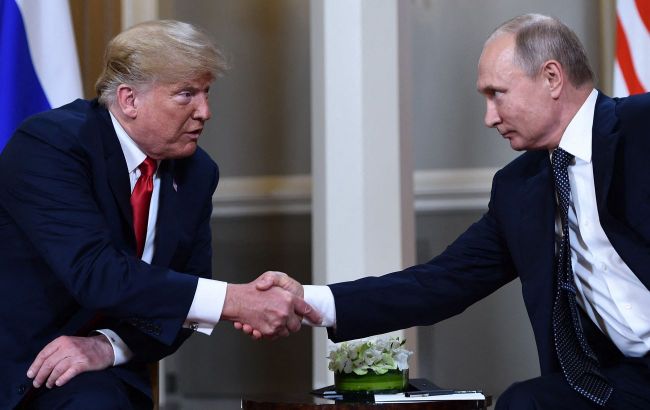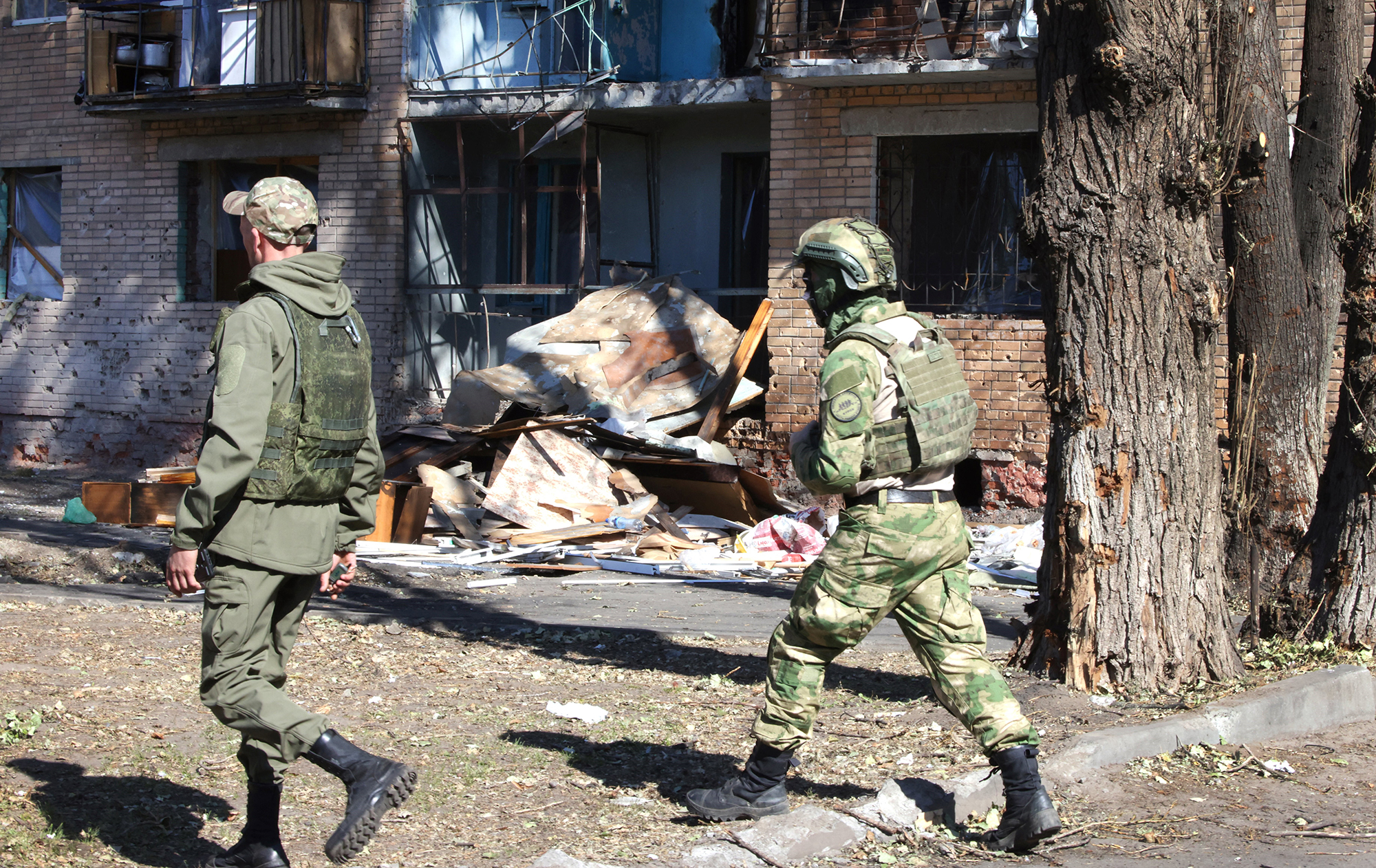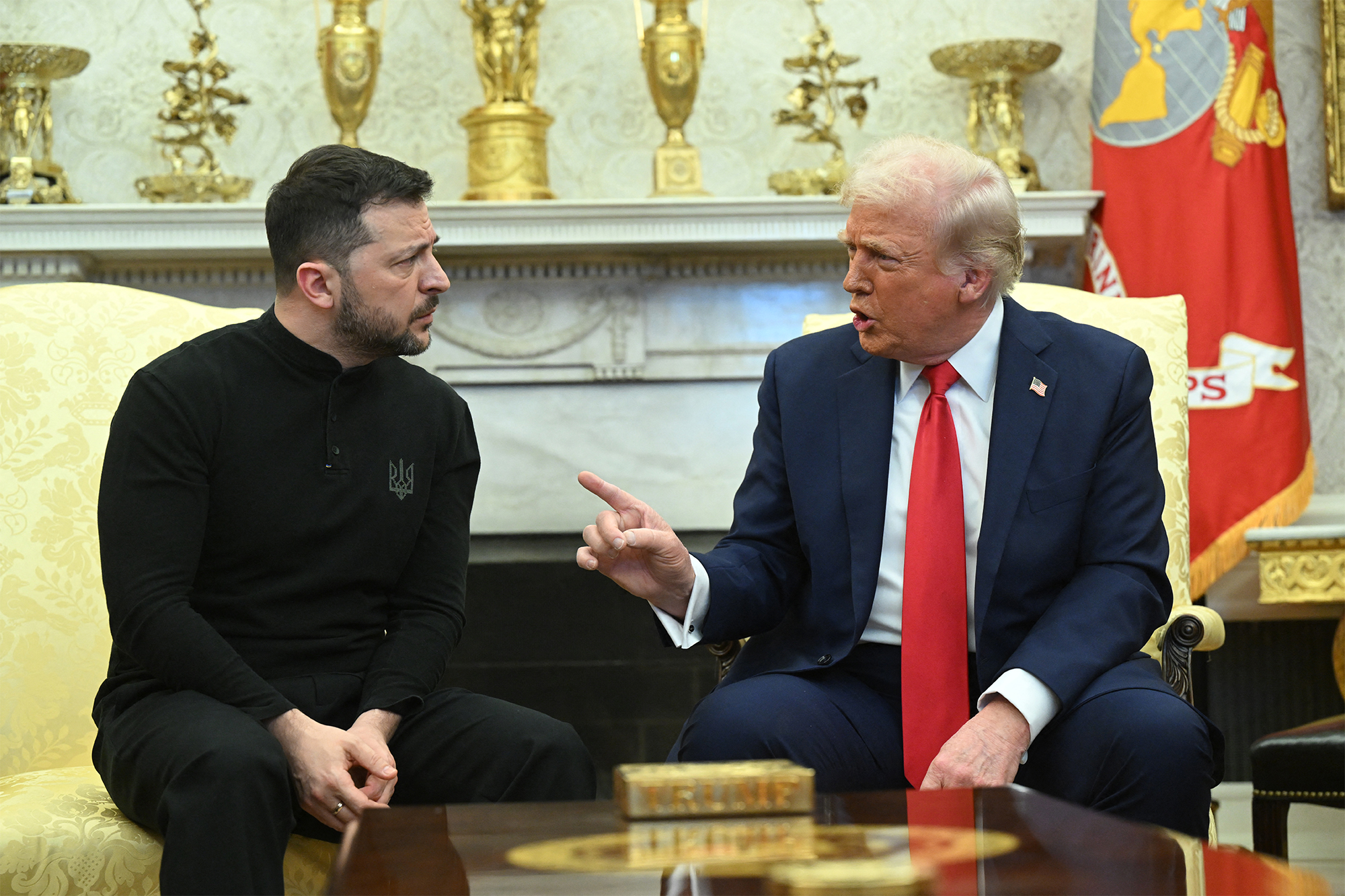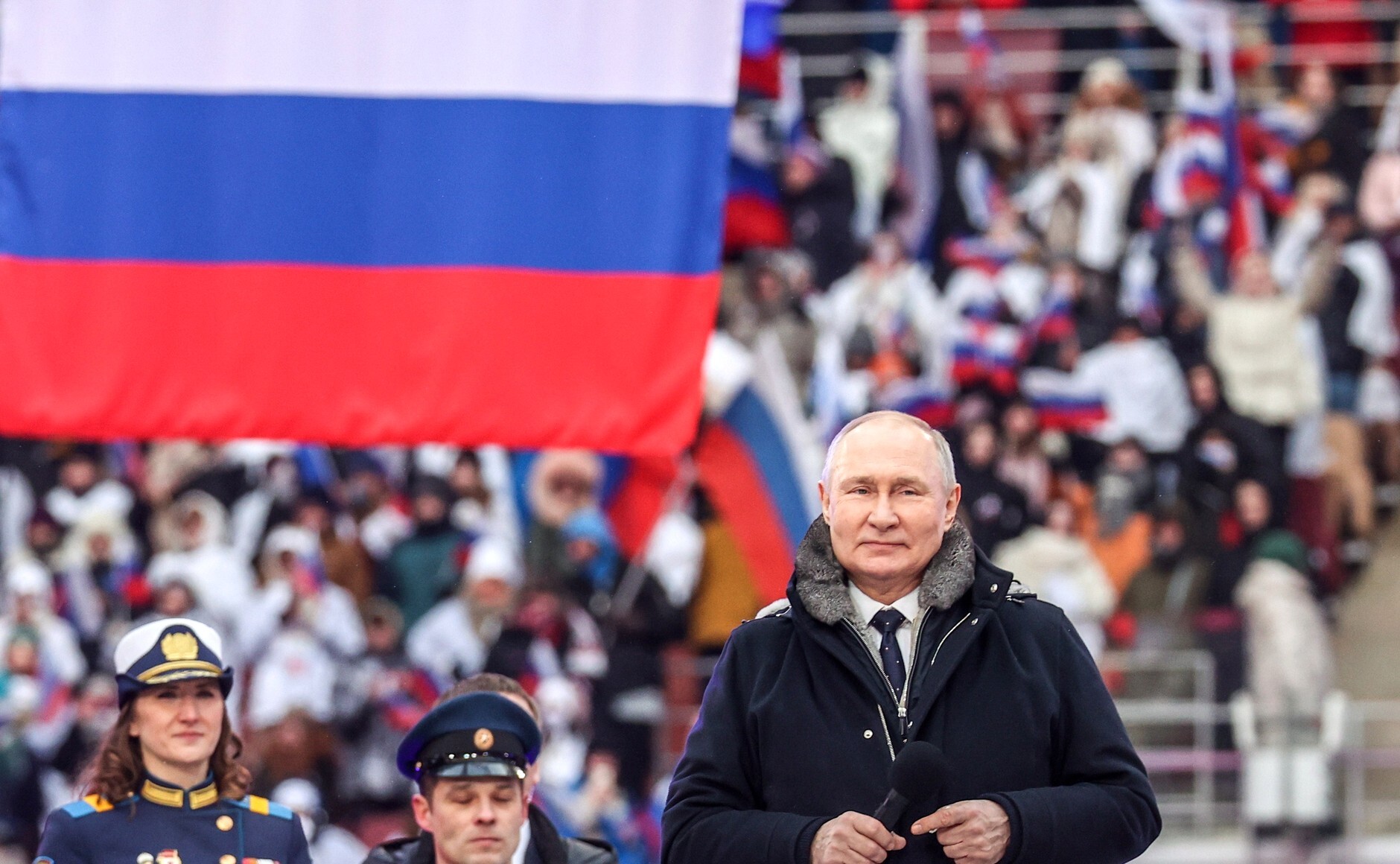'If Trump is good, then Trump is good.' How Russia explains unexpected friendship with US
 Trump and Putin at the meeting in Helsinki in 2019 (Photo: Getty Images)
Trump and Putin at the meeting in Helsinki in 2019 (Photo: Getty Images)
Trump’s favorable attitude toward Putin dramatically influenced Russian propaganda. This is an analysis of how Russian citizens are being sold on another thaw in US-Russia relations and what tools the Kremlin's propaganda machine is using.
Contents
Over the three years of Russia’s full-scale war against Ukraine, Kremlin propaganda has repeatedly transformed. There have been hundreds of different explanations as to why Vladimir Putin decided to invade Ukraine, as well as countless predictions of Russia’s "crushing victories" - all varying degrees of absurd. However, one of the few constants has been the ideological war against the United States.
The US has consistently held the top spot among Russia's enemies. At various victory parades, missiles labeled "To Washington" followed tanks marked "To Berlin". For a long time, the Kremlin believed no one in America was worth talking to - until Donald Trump won the presidential race.
From the outset, Trump made it clear that he saw Russia as a negotiation partner. As soon as he took office, he effectively pulled Moscow out of diplomatic isolation. In American rhetoric, Putin suddenly shifted from being a "bandit" and a "dictator" to a "good guy" who could be dealt with. As a result, even when Trump criticizes Russia's actions, the Kremlin responds with restraint, preferring to remain silent altogether.
Catching on to these signals from the leadership, Russian propaganda has also adjusted its messaging. Suddenly, America is no longer an enemy, leading to a series of statements contradicting what Russian media previously propagated. Ukraine is no longer portrayed as being under US external control, Putin has begun discussing the transfer of natural resources, and Kursk has become a top news topic, despite previously being largely ignored.
Course for Kursk
When Ukrainian forces entered the Kursk region in Russia in August 2024 and quickly took control of part of the area, Russian propaganda remained silent on the matter. It was unclear how the events should be presented, as the Kremlin's position remained uncertain until the last moment. Even in his meetings, Putin mentioned Kursk only superficially, if at all.
The way Russian propagandists operate is simple. They either receive direct instructions on how to cover a particular topic or adapt to circumstances while avoiding improvisation. In the case of Kursk, Russian media had to guess the Kremlin’s stance, so they reported on the situation in the same way Putin did - superficially and without much interest.
Only the most radical propagandists and so-called war correspondents dared to criticize Moscow’s military leadership for the Kursk failure, but even they soon fell silent. Everything changed, however, when Donald Trump announced that he wanted to end the war and would, therefore, negotiate with Putin.
In an attempt to improve its negotiating position, the Russian leadership redeployed rear-line troops from the front to Kursk, concentrating around 60,000 soldiers in the region. Within weeks, Russian forces managed to regain most of the territory previously controlled by Ukrainian forces. During the operation, Putin himself reportedly visited Kursk, dressed in an absurd military uniform, inspecting the command post and speaking with the soldiers.

Russian military in Kursk region (Photo: Getty Images)
All Russian media immediately reported on the "brilliant liberation operation" and widely circulated footage of Putin in camouflage. Kursk became the number one topic, discussed by almost everyone. Propagandists suddenly became deeply concerned about the fate of the region’s residents. One of the Kremlin’s main mouthpieces, Vladimir Solovyov, in an uncharacteristic manner, spoke about the "brave little children" of Sudzha and humanitarian aid trucks. Media outlets that had ignored the issue in August 2024 began referring to the operation as the "Kursk Miracle" by March, squeezing as much as they could out of the story.
When Trump stated that around 2,500 Ukrainian soldiers had been encircled in Kursk, the Kremlin didn’t even need to send signals to its media. Although Ukrainian Defense Forces were still present in the region, Russians were presented with the "Kursk Miracle" as a victory, while the presence of Ukrainian troops was simply ignored - along with the question of whether they were actually surrounded at all.
"No one in the media really mentions that control over Kursk has not been fully restored. Russians deliberately avoid this topic. As Putin once told a schoolboy - Russia never ends. So who in Moscow even knows about some village on the Kursk border, some territory that Russia doesn’t control?" said Andrii Kovalenko, head of Ukraine’s Center for Countering Disinformation, in a comment to RBC-Ukraine.
Russian propaganda has many tools at its disposal. In the case of Kursk, the media was able to successfully lose an important topic but then turn it into a legendary story as soon as there was something to boast about. This technique is not exclusive to Russia - every media outlet emphasizes what it deems important. However, emphasis - or its absence - is not the same as complete erasure, which is what happened with Kursk.
To some extent, Donald Trump played a role in bringing the Kursk issue back into the Russian news cycle. Due to his eagerness to accelerate negotiations, Putin decided to secure a stronger position in them. And for the first time, Russian propaganda seemed to rely on US leadership as a key source when it came to the alleged encirclement of Ukrainian forces.
Not quite external control
One of the tools that Russian propagandists have mastered is the ability to adapt quickly. A viewpoint that today is presented as self-evident could have been the opposite just a month ago.
When Washington established communication with Moscow - at least to the extent possible - propagandists had to abandon several key narratives. One of them was the claim that Ukraine is under external control by the United States. The topic of "external control" had been pushed in Russia for a long time - essentially since Viktor Yanukovych fled Kyiv in 2014. Having lost its leverage over Ukraine, Russia immediately accused the US of becoming Kyiv’s new "masters."
Russian politicians, officials, and propaganda tirelessly repeated this claim. Their words were eagerly echoed by various collaborators, traitors, and pro-Russian figures - Viktor Medvedchuk used the phrase "external control" at least five times in one interview with journalists. Naturally, the idea that Ukraine could possess and exercise sovereignty is seen as blasphemous by Russian propaganda and its audience.
However, pushing this narrative became much more complicated when Trump entered the White House. Within weeks of his active engagement with Ukraine, it became clear that the US had no real control over the country. Otherwise, the Oval Office scandal on February 28 wouldn’t have happened, Kyiv wouldn’t have insisted on its red lines, and Zelenskyy wouldn’t have claimed that Trump was influenced by Russian propaganda.
Moreover, Ukraine didn’t immediately agree to a minerals deal, despite Kremlin narratives that the country had long been sold to Washington along with all its natural resources. While Russian propaganda struggled to adjust, Putin publicly stated that he was open to discussing Russian resources with Trump.

Zelenskyy and Trump at the meeting on February 28 (Photo: Getty Images)
"What, then, can be said about Europe and Ukraine?" asks Russian opposition political analyst Ivan Preobrazhensky in a conversation with RBC-Ukraine. "There was a clear scheme - the Americans control everything, stand behind everyone, Ukrainians lack independence, and Europeans do too; they all execute America's cunning plans. But now, the scheme needs to be reworked - Ukrainians are asserting their agency, rejecting Trump’s proposals, and Europeans are becoming more independent too."
According to Preobrazhensky, the Kremlin has yet to decide how to explain the current situation to Russians. Most likely, propaganda will simply pretend it never said otherwise - something it has done many times before. Meanwhile, a new public perception is forming in Russian society.
To many Russians, Volodymyr Zelenskyy is still seen as a "puppet" controlled by the collective West (though whether the US is still part of that collective remains unclear). Ukraine, once portrayed as fully controlled by the US, is now depicted as a wild land where mythical Nazi battalions defy the president and continue fighting while Moscow struggles to end the war.
"For every audience, there is a version - some believe in Nazi battalions, while others think they’re too smart for propaganda but still see Ukraine’s army as independent from both Zelenskyy and the Americans," Preobrazhensky explains. "The narrative is evolving, but it remains coherent enough to sustain belief."
Soon, this new interpretation will be bolstered by Russian analysis. Propaganda will adjust accordingly, providing Russians with narratives they want to believe - because acknowledging Ukraine as a sovereign actor would make justifying the invasion far more difficult.
The same approach applies to discussions about a ceasefire or peace in general. Initially, propagandists fueled Kremlin narratives and catered to the militant minority that dreamed of taking Kyiv in three days. This led to statements like Margarita Simonyan’s infamous "Ukraine is so small" remark. The Kremlin had hoped for a swift, victorious war that wouldn’t affect most Russians.
In this situation, propagandists are also relying on self-regulation, around which they will shape their position. Since the Kremlin, depending solely on Putin in this matter, has not yet decided whether it wants to end the war, the media has a small but significant carte blanche. In other words, if a ceasefire happens, people will explain it to themselves, and propaganda will help them articulate their own thoughts.
"They’ll wait a bit, watch public reactions, conduct studies, focus groups, closed surveys, gather an overall picture, and then reflect it to the people. Why does the Kremlin operate this way? I don’t know. Maybe the final narrative will be that Putin tricked everyone and achieved all his goals, that we have a great partnership with Trump, and that Ukraine doesn’t even matter anymore because we're now dividing the world. It doesn’t matter which version they choose - the key is giving people a story they want to believe in," says Preobrazhensky.
'Putin is cunning, and I’m by his side'
If we analyze the current sentiments of Russian propaganda, it feels like there has been another thaw in US-Russia relations. Stories about starving Americans and elderly people dying without medical insurance have suddenly disappeared. For some reason, US troops are no longer involved in "terrible crimes" in Donbas, and American military bases have stopped supplying the "Ukrainian Nazis" with new weapons of mass destruction.
Undoubtedly, under today's circumstances, it is beneficial for the Kremlin to build friendly relations with the US Trump extends his hand to Putin and offers to talk, to hear his position, pandering to the Russian dictator's ego. Meanwhile, internal turbulence begins within the Kremlin’s power structure. Propagandists, operating like a swarm, initially self-regulate and act intuitively - Trump is neither heavily criticized nor praised, and statements remain cautious. Then, negotiations between the Russian and American sides begin, and finally, media outlets receive their official guidelines.
 Putin's speech at Luzhniki (Photo: Getty Images)
Putin's speech at Luzhniki (Photo: Getty Images)
"Signals start to appear. One of them is a meeting with television executives led by Alexei Gromov, Putin’s former press secretary and deputy head of his administration, responsible for classical propaganda. Most likely, at this meeting, he distributes lists of people to call for comments on Trump. Those chosen are the ones who interpreted the situation correctly from the Kremlin’s perspective - those who praise Trump and the US," noted Preobrazhensky.
Russians are being conditioned, at the very least, for moderate Trumpist sentiments, and propaganda is being segmented. For the general population, Trump is a peacemaker who has finally heard Putin. The absurd "Putin’s Squads," consisting of a few elderly women, are already congratulating Trump on his victory. There is also content for those who still wish to mock Americans openly.
"Right now, Russian propaganda is ridiculing Trump's team and Trump himself. From Russian fascists like 'Rybar' (a popular Z-channel - ed.) to figures like Solovyov and others. They laugh at Witkoff, they laugh at Rubio, they shout that they will not cease fire, and so on. They mock while simultaneously glorifying their negotiation team. They are trying to boost Putin’s internal rating and promote Putin’s policies by showing that they are standing up to Trump," says Andrii Kovalenko.
There is also a parallel strategy - suggesting that Putin and Trump are best friends and that Russia and the US, as two great powers, will finally divide the world into spheres of influence. In short, the average Russian has plenty of narratives to choose from.
However, there is no talk of America suddenly ceasing to be an ideological enemy. No matter how much propaganda portrays the US as nearly an ally of the Kremlin, neither the media, nor the Kremlin, nor the Russians themselves truly believe it. It’s just that, given today’s reality, it is convenient for Moscow to say so, and a society accustomed to relying on television for guidance eagerly echoes it.
"Many people believe that those at the top know better. If the decision has been made to befriend Trump, then we must befriend Trump. Putin knows what he’s doing - he's smarter than me, he’s the president. He said that he has a good relationship with Trump. He is playing some kind of game, but if he says Trump is good, then Trump is good. Putin is cunning, and I am by his side," Preobrazhensky added.
If the US administration takes any misstep, Russian propaganda can easily shift its narrative. In that case, they will follow Putin’s statements. If, at some point, the Russian dictator declares a stab in the back from Trump, then stories of starving Americans will return to Russia’s media agenda. Along with them, Trump as Russia’s fiercest and eternal enemy.

